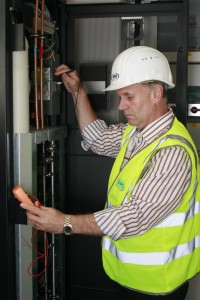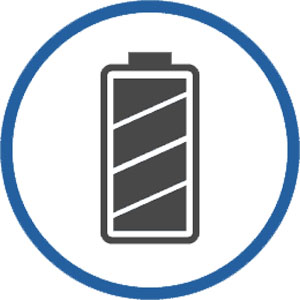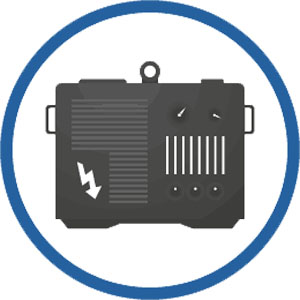| Today was another busy day assisting our clients with uninterruptible power supplies (UPS), otherwise known as standby power systems. It is so important for clients to use qualified UPS engineers, as non-specialist electricians can sometimes miss crucial checks and testing for UPS. My first job of the day was to install REMO for a client with an existing UPS system. REMO is our remote monitoring system, which communicates with and carefully monitors UPS systems, generators and batteries to measure their servicing needs. As soon as REMO detects a fault or a potential problem with the standby power unit, it alerts the customer and our servicing team using a text message or other signal. This ensures that the UPS system is consistently working and prepared in case of a power cut. At UPS systems we highly recommend REMO as it is the most efficient way to ensure continual safe and efficient working order of your UPS system. Before installing REMO I first made sure that the telephone line was operating correctly. I set up the parameters on the SNMP card so that it knew where to send the data, then stored all the set up instructions and connected to the modem. Using my smartphone, I tested that everything was working correctly. The data that came through showed me the state of the battery, the load, runtime, alarms and the temperature, so then REMO® is all I need to keep an eye on this UPS unit. The office system automatically stores a back up of the data in order to build reports to indicate trends that can help us to diagnose problems, like a consistent rise in temperature or an increase in the load. Last of all, I checked that the system was able to dial out to be able to communicate any issues that occur. I checked with the customer before putting the UPS unit into bypass, and REMO immediately dialled out (and a message come straight to my phone). Once these checks and tests had all been made the REMO system was ready to start monitoring the UPS system for a very happy client. |

|
Commissioning a UPS (Uninterruptible Power Supply) System
In the afternoon I commissioned a 60kVA UPS system ready to go live. UPS commissioning is a crucial process in which we undertake electrical testing, product checking and finally setting up the UPS itself. There are over 100 separate checks to make, so you can see why it's important to have a specialist set up your UPS system.
Servicing
We can break down the UPS testing and installation process into seven distinct steps:
- Full electrical test (earth test) of the supply, breakers, cable and connections
- Environmental test to check for temperature, dust and moisture levels
- Product check to make sure that nothing has been moved or broken during delivery
- Checking and connection of the UPS batteries. UPS batteries are very powerful and can give a severe electric shock if faulty or handled improperly, so it is important to check and connect them very carefully.
- Startup the UPS system
- Calibrate the batteries and make a note of the input and output voltages
- A final battery test before transferring the load from bypass to inverter
|
|
Once I had undertaken all these check and tests, I trained the customer up on how to use and care for the UPS system. We always give our clients as much information as possible as we want them to get the most out of their standby power system, and to understand how the system benefits them. I also mentioned the temperature of the room to the customer. At 24°C it could seriously reduce the operating life of the batteries. The customer assured me that aircon was to be installed shortly. So that's it a typical day for me, commissioning a UPS system and installing REMO. Who knows what tomorrow will bring?
UPS Systems plc offers a wide range of uninterruptible power supplies including those from Riello UPS, APC UPS and Eaton UPS as well as the UPS battery packs designed to go with them. We also offer various diesel generators including 60kva generator, 80kva generator and 100kva generator from a wide range of manufacturers including AKSA generator and Pramac generator.



























